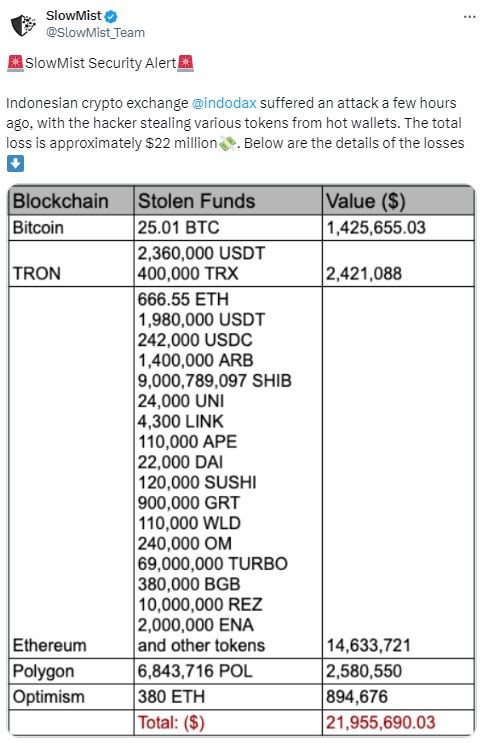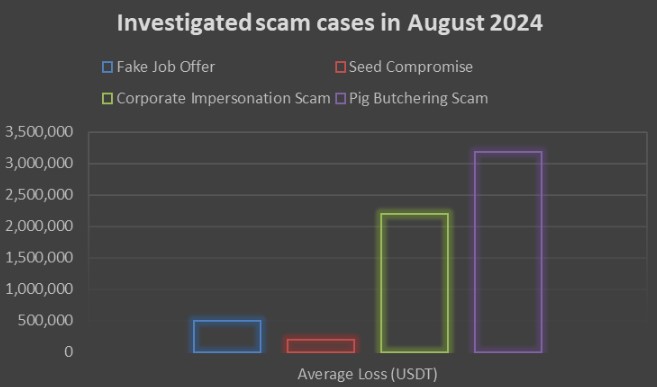
Our weekly roundup of news from Asia curates the industry’s most important developments.
Chinese investors duped by point running and crypto laundering schemes
A new type of cryptocurrency scam is rising in China, with locals losing money to a scheme known as “point running,” according to a warning posted by the Public Security Bureau on Sept. 10.
The term “point running” refers to the practice of moving crypto through various accounts. Often new to digital assets, victims are told that by transferring these cryptocurrencies, they are processing transactions and earning rewards or commissions.


Typically, this scam is marketed as a side hustle, where participants manually move crypto between accounts, with the false promise that these transactions generate profits. In reality, victims may unknowingly act as money mules, laundering funds for illicit operations.
More recent versions of the scam trick victims into depositing their cryptocurrency into platforms that claim to handle the “point running” automatically, making the process seem effortless. Victims are lured with small initial returns, encouraging them to invest more.
In a case highlighted by the Public Security Bureau, a local resident named Wang was introduced to a WeChat group by a friend. The offer was simple: invest in USDT (“U” coins) and watch the money grow. Wang installed an app and initially invested 8,000 yuan (about $1,125), then increased his investment after seeing minor returns. By August, he had invested over 300,000 yuan ($42,112). When Wang attempted to withdraw his funds later that month, he received a screenshot confirming the transaction, but the money never arrived and his “U” balance disappeared from the app.
Wang was paid 2,000 yuan ($280) through “commission” and ultimately lost 280,000 yuan ($39,305).
Authorities warn that these scams are becoming increasingly common as more locals come into contact with cryptocurrencies in China, a nation that has banned several activities related to digital assets, including mining and trading.
Victims are often enticed by promises of high returns with little effort, but authorities say that these schemes not only cause financial loss but are frequently linked to money laundering, further complicating matters for those involved.
Hacked Indodax launches Instagram campaign for damage control
Indodax has taken a unique approach to ease customer concerns after losing $22 million in a hack on Sept. 11 by launching a giveaway campaign on its Instagram account.
The campaign claims it’s giving out 3 million rupiah (almost $200) every hour to three winners chosen from among those who participate in a comment competition responding to posts by the exchange and its CEO, Oscar Darmawan, while the platform remains shut for an “investigation.”
Its customers are now awaiting the results of this investigation into the alleged $22 million exploit, which targeted Bitcoin, TRX, POL, and other ERC-20 tokens, as reported by security firm SlowMist.


The Indodax hack comes almost two months after WazirX, a major exchange in neighboring India, suffered one of the year’s largest hacks, in a $230 million exploit.
WazirX, run by Singapore-based Zettai Pte and its Indian subsidiary Zanmai India, requested a six-month reprieve from the Singapore High Court in late August. This move would allow the exchange to reorganize its debts while temporarily shielding it from creditor claims.
Like WazirX, North Korean state hacking group Lazarus has been accused of conducting the cyber attack on Indodax.
During the annual Seoul Defense Dialogue held on Sept. 11, South Korean Prime Minister Han Duck-soo pinpointed North Korea’s crypto theft for nuclear development as a global security threat.
In his speech, Han announced that the South Korean government is in the process of establishing “core strategic technologies” to preempt such cyber attacks.
Read also
Human trafficking linked to Southeast Asia pig butchering scams
Pig butchering scams in Southeast Asia are on the rise, according to crypto compliance and investigation firm AMLBot.
Among the investigations handled by the company in August, pig butchering scams, a type of romance scam where scammers slowly gain victims’ trust and manipulate their emotions to extract funds, accounted for $3.2 million in victim losses, up from $1 million in July.


“As per our investigation and findings, the large-scale pig butchering syndicates are currently clustered around Cambodia, Myanmar and the Philippines. Out of these, the Cambodian syndicates are being operated by Chinese crime lords,” AMLBot said in a statement shared with Magazine.
They add that a human trafficking angle is involved as children are kidnapped from India and Nepal and trafficked to compounds in Laos where they’re held in captivity and work to scam victims to send them crypto.
In past cases, criminal proceeds were usually laundered through a crypto exchange, but nowadays, they’re funneled through Huione Pay, AMLBot says.
Huione Pay is a foreign exchange business owned by Huione Group, which also operates the multibillion-dollar marketplace Huione Guarantee.
In July, crypto forensics firm Elliptic reported that Huione Guarantee has evolved into an online marketplace that has become a rising preference among pig butchering scammers in Southeast Asia. Merchants in the platform have transacted over $11 billion.
AMLBot’s August investigation aligns with findings from forensics firm Chainalysis.
Chainalysis recently told Cointelegraph that scammers are increasingly shifting from elaborate Ponzi schemes to quicker schemes, such as pig butchering, that target individuals on social media.
Read also
Philippine Science High School to adopt blockchain for managing student records
A top public high school in the Philippines will use blockchain technology to manage and verify its students’ academic records, local broadcaster ABS-CBN reported.
The Philippine Science High School (Pisay) has highlighted how blockchain technology can streamline the process of accessing and managing student records, which traditionally required students and parents to visit schools in person. By implementing blockchain, the new system removes this bottleneck, allowing records to be accessed securely and conveniently online. This approach ensures faster, more efficient service while maintaining the integrity and authenticity of academic documents.
The initiative is being developed under the Department of Science and Technology, and it aims to showcase how blockchain can be used beyond cryptocurrencies, unlocking its potential in public sector applications.
Pisay’s digital certificate is set for testing in late 2024 with a broader rollout planned by 2025.
Several academic institutions have explored blockchain-based certificates to enhance the security and authenticity of academic records. One of the earliest examples dates back to 2017, when the Massachusetts Institute of Technology (MIT) launched its Blockcerts initiative, allowing graduates to receive diplomas in digital format, secured by blockchain technology.
Also in 2017, Australia’s University of Melbourne started issuing blockchain-based micro-credentials for employers to verify student achievements.
Subscribe
The most engaging reads in blockchain. Delivered once a
week.




Yohan Yun
Yohan Yun is a multimedia journalist covering blockchain since 2017. He has contributed to crypto media outlet Forkast as an editor and has covered Asian tech stories as an assistant reporter for Bloomberg BNA and Forbes. He spends his free time cooking, and experimenting with new recipes.

